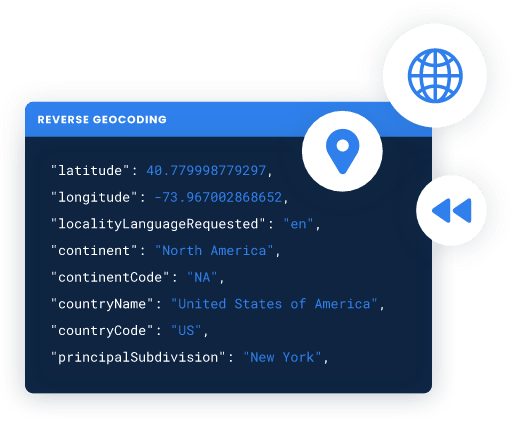REVERSE GEOCODING API PACKAGE
Ultra-Fast & Highly Accurate Reverse Geocoding API
Transform latitude/longitude coordinates into precise locations using BigDataCloud's cutting-edge Reverse Geocoding API. Discover the world's quickest 'Reverse Geocoding to City' service, now with a generous FREE tier. Dive into unparalleled accuracy and comprehensive global coverage, only at BigDataCloud.

Reverse Geocoding API Package Features
Faster Response Time
Enjoy lightning-fast (sub-millisecond) API response time.
Superior Accuracy
Our administrative/non-administrative boundaries-based reverse geocoder provides the most accurate location data.
Global Coverage
We offer full global coverage, including seas and oceans.
Postal Code
Get full postal code level accuracy for the US, Great Britain, and Australia (partial for other countries).
Timezone Info
Receive detailed timezone information based on geocoordinates.
Country Info
Get accurate continent, country, and city-level location data.
Language Support
We provide detailed locality information of a user in 147 common world languages.
FIPS Codes
Supports FIPS Codes to uniquely identify geographic areas within the United States What are FIPS codes?
GraphQL API for Reverse Geocoding API Package
At BigDataCloud, we also offer you the precision of GraphQL for implementing Reverse Geocoding API Package. GraphQL provides a more efficient, powerful, and flexible alternative to the traditional REST API, leading to faster performance and more predictable data retrieval.
It reduces the need for multiple requests by fetching multiple resources in a single query and ensures data integrity with its strong type system. Its self-documenting feature streamlines development, making it a scalable choice for modern applications. You can click on the preview button below to view the data structure of Reverse Geocoding API Package's graphQL API.
Explore the full capabilities of GraphQL with our interactive playground. It's the perfect environment to construct and refine your queries, with complete access to detailed schema documentation that explains every field and type. To unlock this experience, ensure you have an active account with BigDataCloud. Log in to access the playground.
Reverse Geocoding API Package contains the following APIs
Flexible pricing options that scale with your needs
All the plans provide full access to all the APIs listed above. The pricing is based only on the volume of API consumption. Regardless of which APIs you use, the monthly API limit applies to the sum of all the successful API calls made for that month. You can review your current API usage in your account's dashboard.
Once you hit your monthly quota, the API will return errors until the start of the next month, unless you upgrade your package.
If you hit your monthly quota, the API will return errors until next month unless you upgrade. Opt for PAY AS YOU GO to continue service without interruption. You will be billed separately for extra queries at the listed rate.
If you hit your monthly quota, the API will return errors until next month unless you upgrade. Opt for PAY AS YOU GO to continue service without interruption. You will be billed separately for extra queries at the listed rate.
If you hit your monthly quota, the API will return errors until next month unless you upgrade. Opt for PAY AS YOU GO to continue service without interruption. You will be billed separately for extra queries at the listed rate.
The platinum plan is the top-tier plan offered by BigDataCloud. It provides unlimited queries per month without rate restriction or throttling.
Reverse Geocoding API Package Benefits
Better User Experience
Deliver a better user experience by leveraging users’ GPS data or HTML 5 Geolocation data in your mobile apps or websites.
Monitor Physical Assets
Keep track of moving physical assets (fleet, IoT devices, etc.) by translating their GPS position to a readable address with our accurate and fast reverse geocoding service.
Hyper-local Marketing
Generate higher revenue and user engagement by launching hyperlocal marketing communication and campaigns on the web/mobile.
Prevent Online Fraud
Utilise the users' real-time location coordinates to validate user information, online transactions, and interactions, thereby preventing online fraud, spam, and cyberattacks.
Better Compliance
Comply with different territorial rules/regulations and prevent lawsuits by implementing robust geoblocking that utilises users' real-time geocoordinates (online games, digital content copyrights, etc.).
Privacy-Friendly Apps
With our admin-level boundary-based reverse geocoding, you can ensure that you do not accidentally breach users' privacy and become compliant with state laws.